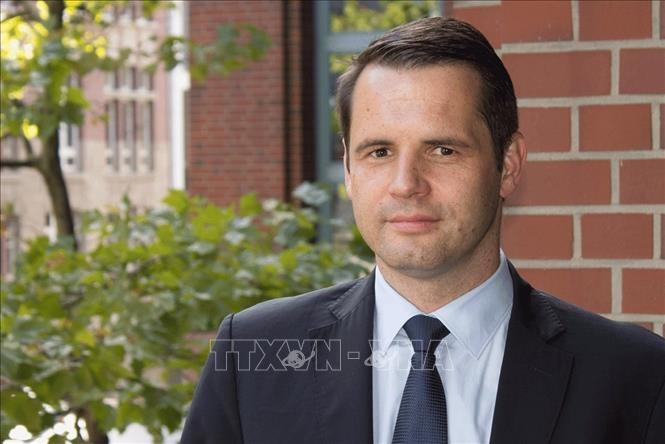
Germany views Viet Nam as most interesting potential market in Asia-Pacific region
Latest
 |
| Daniel Muller, regional manager for ASEAN of the German Asia-Pacific Business Association. (Source: VNA) |
Daniel Muller, regional manager for ASEAN of the German Asia-Pacific Business Association (OAV), made the remarks during a recent media interview held to discuss the country’s economic situation during the first half of the year.
According to Muller, following a decline in growth last year to 2.9% caused by the impact of the novel coronavirus (COVID-19) pandemic, a relatively low fall compared to the global economy, it can be considered that the local economy is recovering in both a positive and dynamic manner.
This was clearly shown in the first quarter of the year, especially in terms of foreign trade, which remains crucial to the Vietnamese economy.
In comparison to the same period from last year, the value of exported goods throughout the first quarter of the year surged by 22%, with imports increasing by 26.3%. The opening four months saw Vietnamese trade turnover reach US$206.5 billion, the highest over the past decade and up 29.5% over the same period from last year.
Despite these figures, Muller believes that the second quarter of the year will struggle to record a similar upward trend compared to the same period from last year, whilst it will also be difficult to reach the same level recorded during the first quarter of the year.
He therefore attributed this to a resurgence of COVID-19 in the nation, which poses major challenges to the recovery process moving forward.
The growing number of new cases over recent days may lead to delays in reopening the border, which will subsequently slow down the recovery of the local tourism industry, thereby negatively impacting economic development in general, he stated.
At present, it is unclear how the wave of outbreaks caused by the new variant of the SARS-CoV-2 virus will affect the country, but Muller believes that economic growth this year may reach an approximate level seen in the years before the pandemic broke out.
With regard to economic ties between the nation and Germany in the first half of the year, Muller said that forums and communication channels serve to deepen joint economic relations. Indeed, the Europe-Viet Nam Free Trade Agreement (EVFTA) plays an important role in stepping up economic co-operation between enterprises from both countries.
With regard to evaluations made by German investors regarding the Vietnamese market, Muller stated that alongside India, the Vietnamese market continues to be regarded by German businesses as having the most potential throughout the Asia-Pacific region.
This can be seen from the exceptionally-high demand for economic information in the country, along with events relating to the country organised by the OAV capturing the attention of German businesses.
The efforts of German businesses to expand operations in Asian countries outside of China continues to show an upward trend, with Viet Nam benefiting from this trend, he noted.
Recently, many German firms operating in the country have moved to increase their investment in order to expand production scale.
The primary goal of these companies is to drastically increase the quantity and quality of their products, with this achieved by investing heavily in the digitalisation process.
For many businesses, the Vietnamese markets boasts the potential to become a regional manufacturing hub, with goods produced in the nation able to supply the entire ASEAN market and the whole of South Asia. In addition, many German enterprises are looking for investment opportunities in the country.
Discussing the prospect of the EU-Viet Nam Investment Protection Agreement (EVIPA), the expert said that the German side is very interested in the agreement following the EVFTA coming into effect. At present, direct investments from Germany into Viet Nam are on the rise, so there is a need for effective regulations relating to investment protection and solutions to be implemented to settle investment disputes, he added.
However, for various reasons, the ratification of the EVIPA among EU member states has been delayed several times. Therefore, it is not possible to predict exactly when the EVIPA will be formally adopted by the German Parliament and the parliaments of other EU members.
It is also likely that the internal situation and short-term political considerations of EU countries may also play a role in this regard, he said.

























